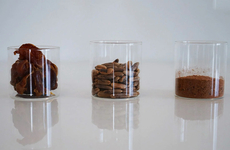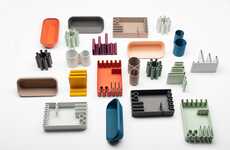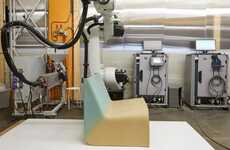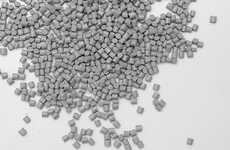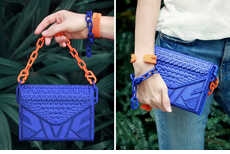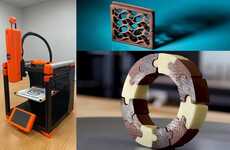
3D Brooklyn's Printer Filament is Made from Recycled Potato Chip Bags
Laura McQuarrie — December 11, 2015 — Eco
References: 3dbrooklyn & 3ders.org
While it's incredibly exciting that 3D printing is a technology that has the potential to change the face of many familiar industries, it's alarming to think that most printer filaments are made from non-recycled plastics.
Fortunately there are now several companies that are taking inventive approaches to 3D printing filaments by recycling automotive dashboards or using water-soluble materials that can be used in additive manufacturing. 3D Brooklyn is a company that's also approaching 3D printing from a perspective that fuses sustainability and creativity—its printer filament is made from recycled potato chip bags. The Recycled Potato Chip Bag Filament is a blend of polypropylene and polyethylene that is reported to have the same texture as wicker furniture.
The unique 3D printing filament was created in collaboration with TerraCycle, a company that partners with brands on projects that involves repurposing waste.
Fortunately there are now several companies that are taking inventive approaches to 3D printing filaments by recycling automotive dashboards or using water-soluble materials that can be used in additive manufacturing. 3D Brooklyn is a company that's also approaching 3D printing from a perspective that fuses sustainability and creativity—its printer filament is made from recycled potato chip bags. The Recycled Potato Chip Bag Filament is a blend of polypropylene and polyethylene that is reported to have the same texture as wicker furniture.
The unique 3D printing filament was created in collaboration with TerraCycle, a company that partners with brands on projects that involves repurposing waste.
Trend Themes
1. Sustainable Filaments - Creating 3D printing filaments from sustainable materials and waste presents an opportunity for disruptive innovation in the 3D printing industry.
2. Recycled Filaments - Using recycled materials like potato chip bags to create 3D printing filaments presents an opportunity for disruptive innovation in the manufacturing industry.
3. Creative Filaments - Developing 3D printing filaments with unique textures and properties presents an opportunity for disruptive innovation in the design and manufacturing industries.
Industry Implications
1. 3D Printing - Exploring sustainable and recycled materials for 3D printing filaments presents an opportunity for disruptive innovation in the manufacturing and design industries.
2. Packaging - Repurposing waste materials like potato chip bags for 3D printing filaments presents an opportunity for disruptive innovation in the packaging industry.
3. Waste Management - Partnering with companies like TerraCycle to repurpose waste materials for 3D printing filaments presents an opportunity for disruptive innovation in the waste management industry.
1.8
Score
Popularity
Activity
Freshness

